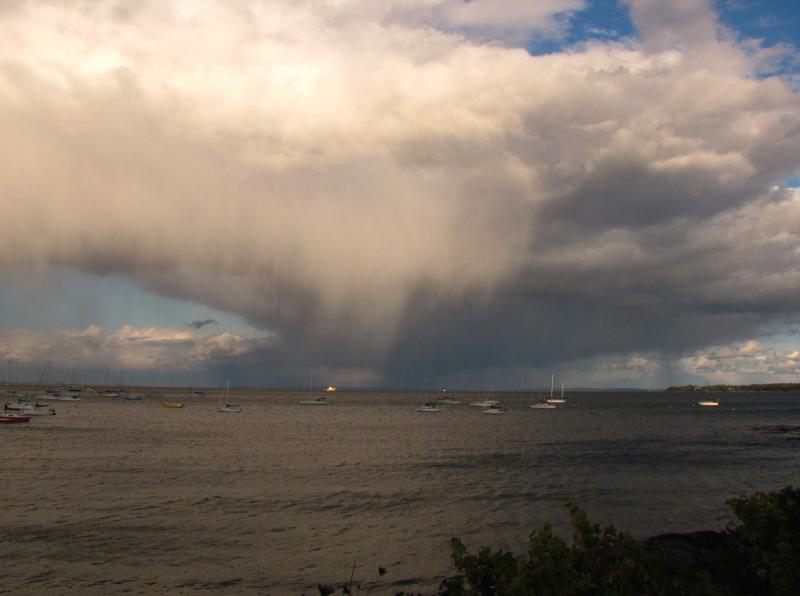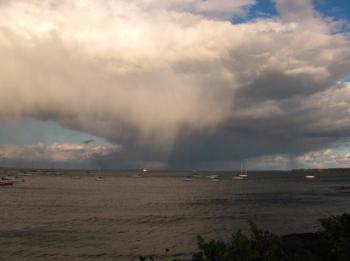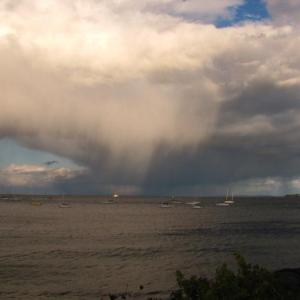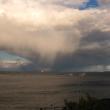Eva Murray: Missing man formation
 On Oct. 5, 2011, a strong and extensive squall blew down over Penobscot Bay. Pilot Don Campbell died that afternoon, attempting to land his small plane on Matinicus. Photographer Bob Trapani captured that fateful weather with his camera, his vantage point of Rockland Harbor, as it traveled across the water and over the islands. (Photo by Bob Trapani)
On Oct. 5, 2011, a strong and extensive squall blew down over Penobscot Bay. Pilot Don Campbell died that afternoon, attempting to land his small plane on Matinicus. Photographer Bob Trapani captured that fateful weather with his camera, his vantage point of Rockland Harbor, as it traveled across the water and over the islands. (Photo by Bob Trapani)
 On Oct. 5, 2011, a strong and extensive squall blew down over Penobscot Bay. Pilot Don Campbell died that afternoon, attempting to land his small plane on Matinicus. Photographer Bob Trapani captured that fateful weather with his camera, his vantage point of Rockland Harbor, as it traveled across the water and over the islands. (Photo by Bob Trapani)
On Oct. 5, 2011, a strong and extensive squall blew down over Penobscot Bay. Pilot Don Campbell died that afternoon, attempting to land his small plane on Matinicus. Photographer Bob Trapani captured that fateful weather with his camera, his vantage point of Rockland Harbor, as it traveled across the water and over the islands. (Photo by Bob Trapani)
About a week ago I sat beside Steve the pilot as we took off from Owls Head for Matinicus, a flight home after a few days of mainland obligations. It was, as we say, “flyable” — but it was no day for a lesson. The stiff west wind was building. Still within the safety limit, Penobscot Island Air was flying passengers but the ride would be bumpy and the landing would make a pilot work for his day’s pay. Islanders have to fly in these conditions all the time.
Eva Murray submits these words, with deep affection and respect for Don and for all the pilots and responders, because she is unable to be on Matinicus on Oct. 21. Otherwise, her offering would have been a batch of doughnuts.
SCHEDULE CHANGE
The memorial for Don is scheduled for Sunday, Oct. 21, at 12:30 p.m. on Matinicus Island. Captain George Tarkleson will be leaving Journey’s End Marina with the passenger boat Robin R. at approximately 11:30 a.m., and will return to Rockland at 2 p.m. Of course, if weather permits, flying is also an option.
Steve took the little Cessna to 3,000 feet, higher than we often go but where the winds were calmer, and we flew more or less over Dave, who was headed back to the mainland from Criehaven. He commented to Steve over the radio that there were some nasty crosswinds at Matinicus. I heard it all because I like to sit in the front and wear the headset and talk to the pilot and ask questions — sometimes dumb ones. For many years I flew in these planes thinking of myself as little more than another piece of island freight, with little knowledge of the machine around me or the thought processes behind short-strip landings. I may as well have had a UPS sticker on my forehead, or one of those orange routing labels they put on the grocery boxes from Shaw’s.
The Matinicus airstrip, historically little more than 500 yards of dirt road, is a construction site this month. Our little strip through the woods is becoming wider, safer, with fewer rocks in the surface layer and fewer low spots to create mud holes and icy patches in season. The pilots talk to the dump truck driver on the radio, identifying themselves as coming in for a landing, as the truck, the bulldozer, the grader get out of the way: “Matinicus traffic, Stationair one-five-X-ray…”
Like I said, we do this all the time.
Last year, on the afternoon of Oct. 5, expert pilot Don Campbell’s airplane was hit by some sort of microburst or strange weather phenomenon as he was landing on Matinicus, and he was pitched helplessly into the woods. When the wild weather took him, Don’s plane somehow flew between two spruce trees standing close together. He must have been flipped a full 90 degrees, wings up and down. The plane severed a power line without touching the phone line just a few feet away. Our good friend Don died instantly. There were no passengers.
My husband, remembering that day, said: “One instant it was flyable here and the next instant it wasn’t. Five minutes would have probably made all the difference.” My brother in South Thomaston happened to say on that day, “This wind thing hit my house like a freight train.”
On the 20th of this month, if the weather cooperates, a small memorial plaque will be erected on Matinicus. Islanders, pilots, and Campbell family and friends plan to assemble and spend a few minutes together remembering Don. There will no doubt be a bit of quiet, and no doubt our Kevin Waters (who runs PIA) will probably get fairly choked up, and there will be hugs, and memories to make one shudder, and there will be some smiles despite everything, and no doubt there will be plenty of homemade cookies and cake.
I fly with these pilots a lot. I remember flying with Don while he spoke about being a Civil War reenactor, talking about the historic collection downstairs in the Rockland Library, the Grand Army of the Republic. I remember flying with Don as he talked with such love about his daughter, Beth, who is about the same age as our daughter, Emily. At least at that time, both of our daughters were thinking about studying languages in college. I remember Don after the other wreck, my wreck, talking about the engine, trying to figure out what went wrong with Nine Ten Tango Alpha, the one that went down in the bay the July before with me and Abbie and K.C. and Rob aboard it, the one which resulted in a rescue. Don was an aircraft mechanic and he had a headful of technical questions. He cared about this stuff.
We all remember how Don was cautious and conservative about the flying weather. Often, we who live on this island, find ourselves hanging around the flying service office, waiting for things to improve, hoping to get home and sleep in our own beds that night when the weather is not making its intentions clear. Where some pilots would try to be optimistic and say things to us like, “Well, let’s see what it does in an hour,” Don would just say: “No. Go get a room, come back tomorrow.” He did not mess around with high wind conditions or fog or anything else too weird. You knew that if Don said it was flyable, it was flyable; we all knew he would never cowboy around. He didn’t fly on the edge.
I was hurt and angered by the few folks who, knowing nothing about these skilled pilots and how this air service works and what island residents deal with every day, thought it appropriate to make mean-spirited comments after the news stories last year about Don’s crash. “What was he doing out in that kind of weather just to fly groceries?” Something like that. Worse. Of course, when Don took off, it wasn’t “that kind of weather.” They’d been flying all day. I flew earlier that day, and it being only three months after my own aviation accident, you can be sure I wouldn’t have been flying in anything I thought marginal conditions. I was still a bit white-knuckled then. I was still jumping whenever the sound of the engine changed. The truth is Don helped me feel more at ease.
The afternoon of Oct. 5, 2011 I was in Belfast, headed for Unity, to the Maine Organic Farmer’s and Gardener’s Association wrap-up meeting after the Common Ground Fair. As I left a store in Belfast and got into my car, it was hailing. Very peculiar weather. I drove to Unity; I noticed how the sky looked sort of strange. I parked outside the exhibition hall on the MOFGA fairground and went inside to have a potluck supper with other fair volunteer staff. I sat down with my plate across the table from Kalem Malcolm, a LifeFlight paramedic who works as one of the EMS/First Aid coordinators for the fair. We were talking about how sometimes the bureaucrats in EMS don’t understand island logistics problems and such things. His phone rang; it was LifeFlight pilot Dave Burr, whose parents had been my neighbors and good friends on Matinicus before they died a few years ago. The message: something was wrong and I should call home.
I went out to my car, got the cell phone and called home. No answer.
Back inside to the meeting, and to Kalem’s phone. He called Dave Burr back, if I remember right; the details have blurred a bit. Soon, he led me out of the noisy, happy, group with their organic potluck into the hallway with a very serious look on his face. My heart rate was beginning to speed up. Once out of the hubbub, he held up his phone and showed me a text message from Burr: another crash on Matinicus, this time a fatality.
I called Penobscot Island Air, even though normally they’d have been closed by that time of day. Dispatcher Jim Nichols answered and he didn’t sound too good. “Who..?” “It was Don.” He could barely say it.
My knees felt a little weird. I sat down on a bench.
Kalem explained, “Paul and Dave were worried that you’d hear the news on the radio while you were driving.” Something like that. They didn’t want me swerving into a ditch somewhere in the back of Waldo County.
“What are you going to do now?” asked Kalem, after a few minutes had gone by. “I’m going to go back in there and sit down. I sure as heck am not ready to drive anywhere right now.” I couldn’t really eat my supper. One’s instinct, at such a time, is to go home or to go help; of course both were impossible.
On the island, people heard a terrible sound, a noise like nothing they’d heard before. Maury, Robin, Clayton — people went running. Everybody tried but there would be no rescue this time. It was not until another pilot, Mike Falconeri, landed on the island that people knew which pilot was under that wreckage. Don’s hand was accessible; they took a pulse but found none. They brought big worksite lights, they cut trees, they made coffee, they told each other to calm down when some wanted to tackle the scene too aggressively. They had to leave the wreckage alone until the investigators got there. The Knox County Emergency Management chief sent for the Camden First Aid Association’s extrication specialists; those guys showed up with the Marine Patrol, bringing power tools, the Jaws of Life, stuff like that. Among them was Justin Hills, who helped me to become a CPR instructor a few years ago. The team told the islanders: “Let us get him out of there. We didn’t know him personally like you did; you know what it’s going to be like. You don’t need that image of your friend in your head. Let us do this part; it’s what we do.”
I wasn’t there but I imagine Justin saying these things with the utmost compassion and gentleness. Justin Hills is about nine feet tall. The islanders replied, “As soon as you get him out of the airplane, we would like to carry him.” They did. They carried him away from the smashed Cessna and out of the woods. They carried Don to the island church, where people stayed with him as a show of respect. Reverend Rob Benson and Suzanne Rankin and others stayed late and came back early, keeping an informal vigil so that Don’s family would know he wasn’t alone out here on this rock. The pilots may as well be our brothers and uncles.
I had spent the night in Belfast, and went directly to the air service office in the morning. The Marine Patrol was bringing Don to Rockland, and Chief Pilot Roger Wolverton was headed to the Coast Guard Station to meet them. I asked Wolverton if I could go too. I wore my son’s Penobscot Island Air work shirt. I was allowed to help carry him up the ramp from the Marine Patrol boat to the hearse, on the Matinicus Island Rescue Stokes basket stretcher, under a neatly folded blue tarp. I was glad I could be there behind that security fence, “helping” even though they didn’t really need my help. I felt it was an honor. The funeral director took care of Don, and I took the stretcher and the tarp. Somebody had to.
Days later, we stood in a Waldoboro cemetery as the planes did the Missing Man Formation flyover. Over the cemetery fence, my cousin Melvin’s cows. At the VFW Hall we drank coffee and ate cookies and I told Kevin that I wanted the student pilot ground school materials.
A few days later, the South Thomaston photographer who took the aerial shot on the cover of my book Well Out to Sea told me that Don had been her pilot that day. I can see him in my mind’s eye sitting in the left seat, flying the plane, when I look at that cover.
Eva Murray lives on Matinicus.
Event Date
Address
United States
























